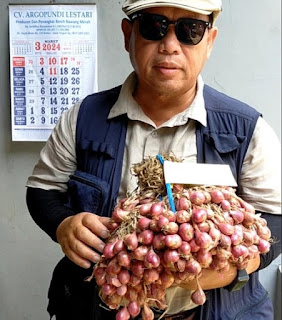Actually the using of a high quality seed is very important for a successfully cultivation and an increasing of vegetable production including for shallot. Vegetables ‘production are much more influence by seed. In selecting seed varieties, farmers consider various aspects such as seed produces high yield, resistant to pest and disease, and growth well. Moreover, it is fit with its environment, the price is affordable and it is favoured by market. In the regard with the shallot, previous studies showed that farmers decided certain shallot varieties to be planted was affected by several factors such as production, time planting, a resistance of shallot to pest and disease, shape, colour, flavour (aroma), number of stems and market demand toward shallot varieties. Indonesian government through Indonesian Vegetables Research Institute (IVegRI) have conducted some efforts to produce new and high qualities shallot varieties so that farmers could adopted the varieties. For shallot, until currently IVegRI has releases 11 shallot varieties known as Bima Brebes, Maja Cipanas, Kramat 1, Kramat 2, Kuning, Sembrani, Katumi, Mentes, Pancasona, Pikatan and Trisula. Meanwhile reported that in shallot farmer itself develops various local shallot varieties for instance Lembah Palu from Central Sulawesi, Medan from Samosir-North Sumatera, Maja Cipanas from CipanasWest Java, Sumenep from Madura, Kuning and Gombong from Brebes- Central Java. Nevertheless until currently, majority of shallot farmers in Indonesia use Bima Brebes and Bima Curut varieties. Almost 95% of the farmers use the varieties for their farms.
The conclusion of this study found that there are various excellency aspects of shallot variety such as high production, able to be planted during the year, ease to be seed, number of stems is higher, resistant to pest and disease and longer age store that cause farmers change their shallot variety to new ones and persist until today. For farmes in Wanasari, Tanjung, Kemukten and Limbangan Brebes, they choose Bima Brebes and Bima Curut varieties. Based on the study, for the breeders who want to release new shallot varieties, it is needed to concern with those aspects. The breeders also are necessity to looking for other excellences of new shallot varieties. Hence, when they are introduced to farmers, the farmers would like to use the new shallot varieties. Thanks...
M Anem,
Royal Hotel, Bogor,
Jawa Tengah, Indonesia.
Mac 2024.




No comments:
Post a Comment